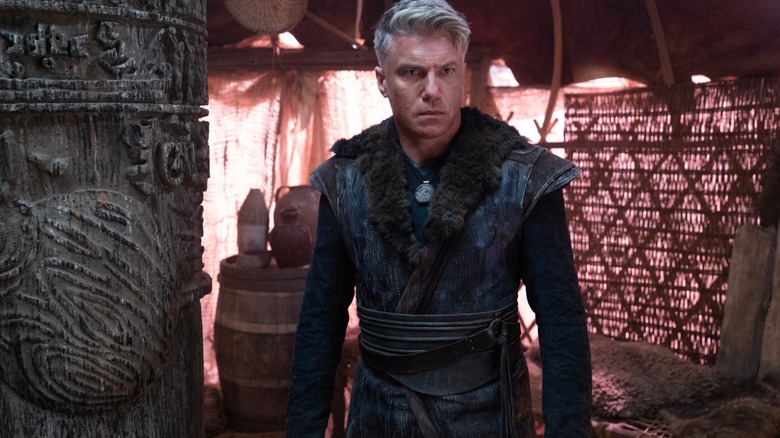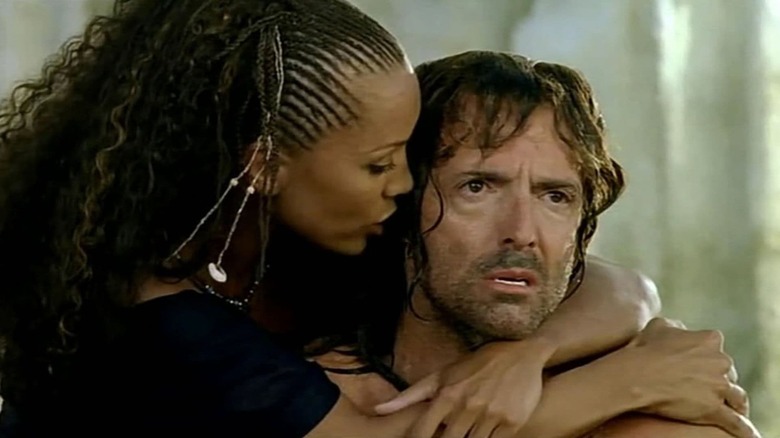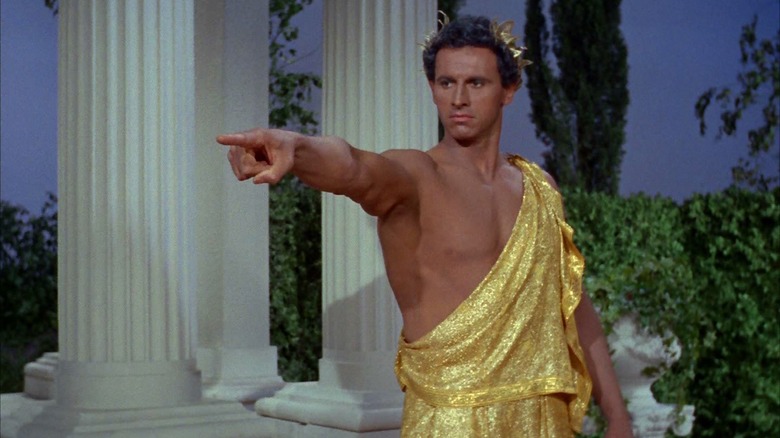How Star Trek: Strange New Worlds' Latest Episode Title Recalls The Original Series (And Greek Myth)
The latest episode of "Star Trek: Strange New Worlds," called "Among the Lotus Eaters," sees Captain Pike (Anson Mount) returning to Rigel VII, the planet from the original "Star Trek" pilot, "The Cage," back in 1966. Rigel VII was living through a medieval period in its history, and, in "The Cage," Pike led an away mission there, accidentally leading to the deaths of three crew members. In "Lotus Eaters," it is revealed that Pike also accidentally left behind some evidence of Starfleet's existence in express violation of the Prime Directive. Pike and his crew must return to Rigel VII and undo the damage.
When they return, however, the Enterprise finds that Rigel VII possesses an unexpectedly mysterious quality: those who stay there too long begin to lose their long-term memories. Some basic information remains embedded in their brains — they retain language, personality traits, and learned skills — but it's not long before Pike and his crew forgets who they are. The Starfleet officers will spend the episode trying to free themselves from a Rigellian prison without knowing anything about who they are or why they need to escape. It's an intense episode.
The title of the episode will, of course, be very familiar to anyone who remembers reading Homer's "The Odyssey" in junior high school. In book IX of the ancient epic, Odysseus, on his way back home to Ithaca, gets waylaid in the Land of the Lotus Eaters, a relaxing and languid isle where the denizens did indeed eat lotus flowers. When Odysseus' shipmates taste the flowers, they forget all about wanting to return home. The Land of the Lotus Eaters is a place where you forget.
The Odyssey
We all remember "The Odyssey," right? Of course, we do! Odysseus, after the events of the Trojan War, is stranded on a Mediterranean island with a beautiful nymph named Calypso for eight years. His wife, Penelope, is stuck at home in Ithaca, weaving incessantly and fending off a lot of obnoxious fratboys who want to sleep with her. Odysseus begins making his way home, but runs into many dangers and trials on the way, including a sea monster, a whirlpool, a cannibalistic cyclops, a sorceress who turns them into pigs, an island of Sirens, and of course the Land of the Lotus Eaters. To quote the 1919 translation of "The Odyssey" by A.T. Murray:
"So they went straightway and mingled with the Lotus-eaters, and the Lotus-eaters did not plan death for my comrades, but gave them of the lotus to taste. And whosoever of them ate of the honey-sweet fruit of the lotus, had no longer any wish to bring back word or to return, but there they were fain to abide among the Lotus-eaters, feeding on the lotus, and forgetful of their homeward way."
The classical reference to Homer's poem in a "Star Trek" episode title is, of course, a long-standing tradition in the franchise. Trek often leans heavily on books in the Western Canon. Just last week, audiences witnessed an episode called "Tomorrow and Tomorrow and Tomorrow," which is a line from William Shakespeare's "Macbeth," used to describe the futility of life. The same speech provided the original "Star Trek" with the episode title "All Our Yesterdays." /Film has previously compiled all the "Star Trek" titles that were taken from Shakespeare.
Star Trek and the Western Canon
In addition to "The Odyssey" and the Bard, "Trek" has made references to Shelley ("Who Mourns for Adonais?"), the Bible ("And the Children Shall Lead"), the 17th-century English poet George Herbert ("Is There in Truth No Beauty?"), and Raymond Chandler ("The Big Goodbye"). The reason Trek tends to zero in on classical references is twofold. First, "Star Trek" takes place in a post-capitalist society, presumably when all arts are in the public domain. Having a contemporary book or music cue in an episode of "Star Trek" would involve a lot of licensing, adding a commercial element to Gene Roddenberry's money-less ideal. Second, it implies that Starfleet officers are no longer beholden to novelty or recency bias, preferring to study and listen to works of art that have stood the test of time. They consume art because it enriches them, not because they want to be cool or are only exposed to the hippest, newest things.
There is, of course, a larger issue with "Star Trek" literary references, and it extends from issues with the Western Canon in general; briefly, it's still a canon of art constructed by dead white authors. Academia has long been infected with a racist, sexist undercurrent, as the Canon was extracted from racist and sexist systems, leaving women and authors of color off of many a college syllabus. It's only been in the last few decades that earnest diversification of the Canon — and even its rejection — has taken place.
Of course, in 1966, it's likely "Star Trek" writers were raised with the Western Canon, and they had the presence of mind to include classical references galore. Whatever one might think of the Canon, lit nerds everywhere will happily grin when Trek drops a "Götterdämmerung" reference.


